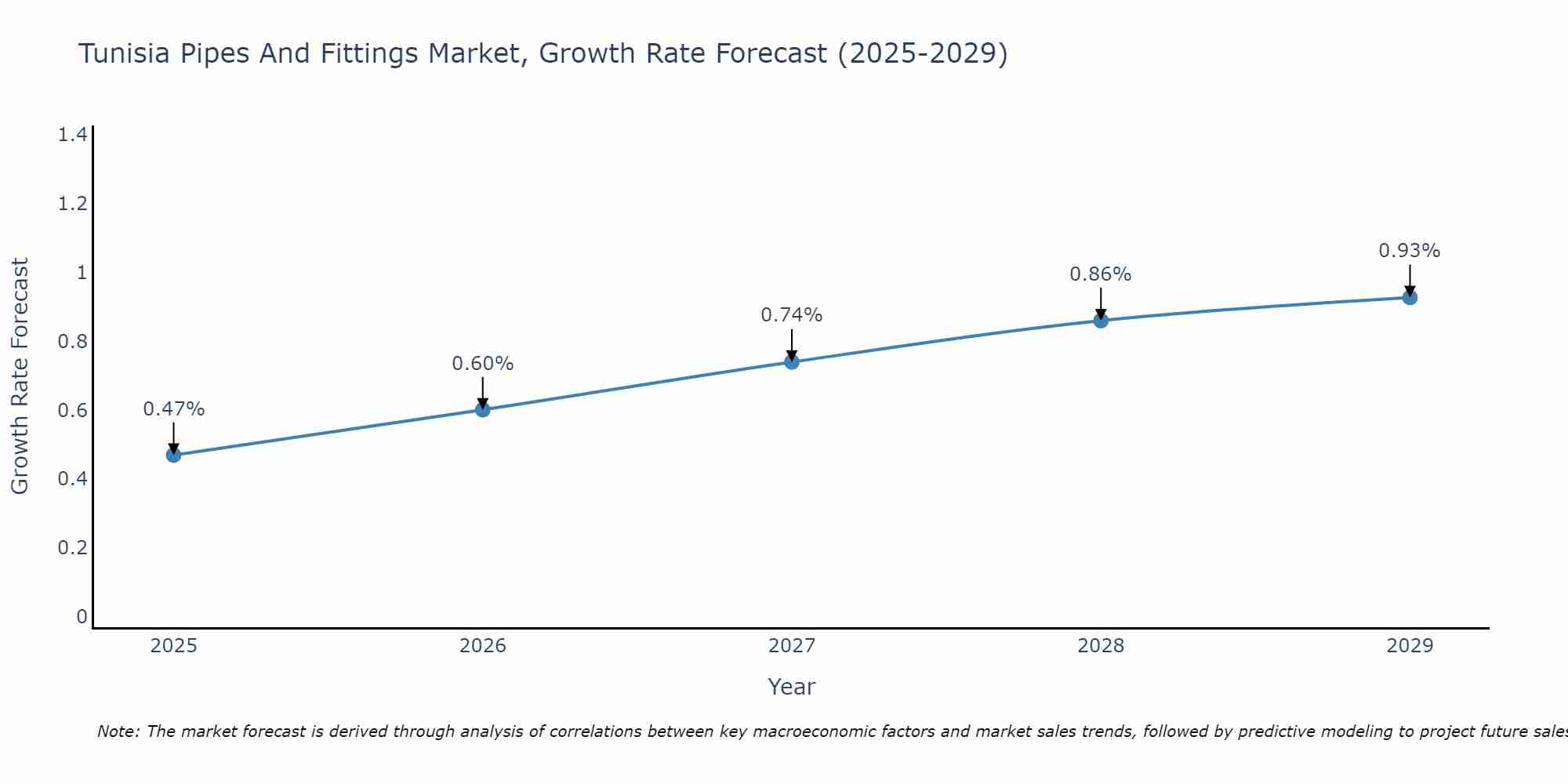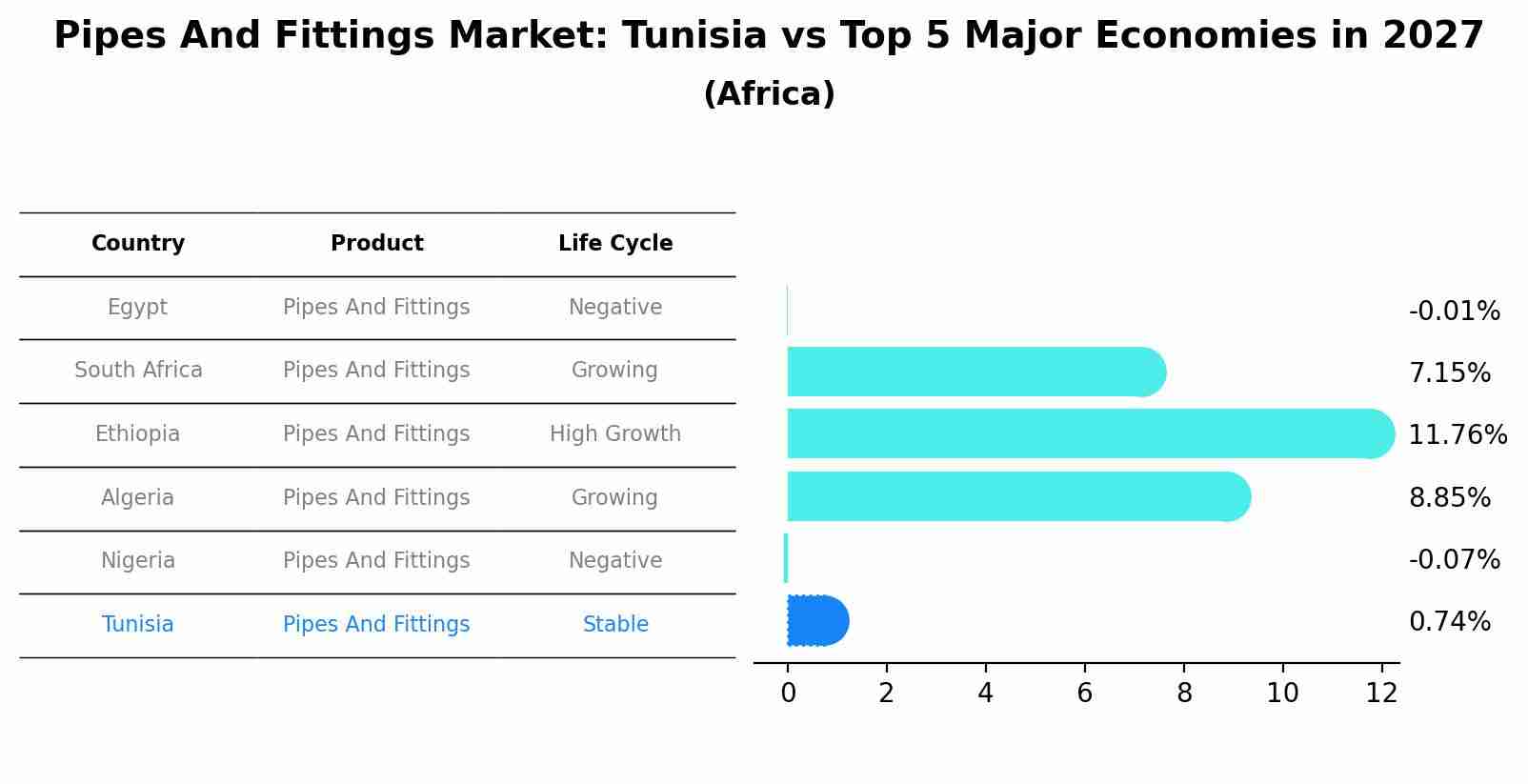Tunisia Pipes And Fittings Market Outlook | Trends, Revenue, Industry, Companies, Share, Value, Analysis, COVID-19 IMPACT, Size, Forecast & Growth
| Product Code: ETC377514 | Publication Date: Aug 2022 | Updated Date: Jul 2025 | Product Type: Market Research Report | |
| Publisher: 6Wresearch | Author: Vasudha | No. of Pages: 75 | No. of Figures: 35 | No. of Tables: 20 |
Tunisia Pipes And Fittings Market Size Growth Rate
The Tunisia Pipes And Fittings Market is poised for steady growth rate improvements from 2025 to 2029. The growth rate starts at 0.47% in 2025 and reaches 0.93% by 2029.

Pipes And Fittings Market: Tunisia vs Top 5 Major Economies in 2027 (Africa)
By 2027, Tunisia's Pipes And Fittings market is forecasted to achieve a stable growth rate of 0.74%, with Egypt leading the Africa region, followed by South Africa, Ethiopia, Algeria and Nigeria.

Tunisia Pipes And Fittings Market Synopsis
The Tunisia pipes and fittings market is experiencing steady growth driven by infrastructure development, urbanization, and industrial projects in the country. The market is characterized by a wide range of products including PVC, HDPE, and PPR pipes and fittings used in various applications such as water supply, sewage systems, and irrigation. The increasing demand for modern plumbing systems, along with government initiatives to improve water infrastructure, is expected to boost market growth. Key players in the industry are focusing on product innovation, quality, and sustainability to remain competitive in the market. Additionally, the market is witnessing a shift towards eco-friendly and durable piping solutions to meet the growing sustainability concerns among consumers.
Tunisia Pipes And Fittings Market Trends
The Tunisia Pipes and Fittings market is experiencing a shift towards more sustainable and environmentally friendly products, driven by increasing awareness of the importance of water conservation and efficient infrastructure. There is a growing demand for advanced materials such as PVC, HDPE, and PPR pipes that offer durability, corrosion resistance, and are recyclable. Additionally, the construction sector in Tunisia is witnessing steady growth, leading to a higher demand for pipes and fittings for various applications including water supply, sewage systems, and irrigation. Manufacturers are also focusing on innovation, introducing smart technologies and solutions to improve efficiency and reduce maintenance costs. Overall, the market is projected to continue growing as the country invests in infrastructure development and sustainable practices.
Tunisia Pipes And Fittings Market Challenges
In the Tunisia Pipes and Fittings market, several challenges are prevalent. One major challenge is the presence of counterfeit products, which can undermine the reputation of genuine manufacturers and compromise the quality and safety standards of the products. Additionally, the industry faces issues related to inconsistent government regulations and policies, which can create uncertainty for businesses operating in the market. Another challenge is the limited access to advanced technology and machinery, which hinders the ability of manufacturers to innovate and improve their production processes. Furthermore, fluctuations in raw material prices and currency exchange rates pose challenges in maintaining competitive pricing strategies. Overall, addressing these challenges requires collaboration between industry stakeholders, government bodies, and regulatory authorities to ensure sustainable growth and development in the Tunisia Pipes and Fittings market.
Tunisia Pipes And Fittings Market Investment Opportunities
In the Tunisia pipes and fittings market, there are several promising investment opportunities. One such opportunity lies in the growing infrastructure development in the country, including the construction of new residential and commercial buildings, as well as industrial projects. This is driving the demand for high-quality pipes and fittings for plumbing, sewage systems, and irrigation. Additionally, the government`s focus on improving water supply and sanitation systems presents another attractive investment avenue in the sector. Investing in innovative and sustainable pipe materials, such as PVC, HDPE, and PPR, to meet the increasing demand for durable and cost-effective solutions can be a lucrative opportunity. Furthermore, the potential for export opportunities to neighboring countries in North Africa and Europe could further enhance the market prospects for investors in the Tunisia pipes and fittings industry.
Jordan Agar Market Government Policies
The Tunisia Pipes and Fittings Market is subject to various government policies aimed at promoting the use of high-quality, safe, and environmentally friendly products in the construction industry. The government has implemented regulations to ensure that pipes and fittings meet specific standards for durability, efficiency, and sustainability. Additionally, there are policies in place to encourage the use of locally manufactured products to support domestic industries and reduce reliance on imports. These policies also focus on promoting innovation and technology adoption in the sector to enhance productivity and competitiveness. Overall, the government`s initiatives in the Tunisia Pipes and Fittings Market are geared towards fostering a thriving market that prioritizes quality, safety, and sustainability while also supporting local businesses and driving economic growth.
Tunisia Pipes And Fittings Market Future Outlook
The Tunisia Pipes and Fittings market is expected to witness steady growth in the coming years, driven by increasing construction activities, infrastructure development projects, and the rising demand for water and wastewater management systems. The government`s focus on improving water supply networks and sanitation facilities will further boost the market. Additionally, the growing industrial sector and investments in oil and gas exploration will drive the demand for pipes and fittings in the country. Manufacturers are likely to introduce innovative products to meet the evolving consumer needs and adhere to stringent quality standards. However, challenges such as fluctuating raw material prices and intense competition among key players may impact market growth to some extent. Overall, the Tunisia Pipes and Fittings market is poised for expansion with opportunities for sustainable development and technological advancements.
Key Highlights of the Report:
- Tunisia Pipes And Fittings Market Outlook
- Market Size of Tunisia Pipes And Fittings Market, 2021
- Forecast of Tunisia Pipes And Fittings Market, 2031
- Historical Data and Forecast of Tunisia Pipes And Fittings Revenues & Volume for the Period 2018 - 2031
- Tunisia Pipes And Fittings Market Trend Evolution
- Tunisia Pipes And Fittings Market Drivers and Challenges
- Tunisia Pipes And Fittings Price Trends
- Tunisia Pipes And Fittings Porter's Five Forces
- Tunisia Pipes And Fittings Industry Life Cycle
- Historical Data and Forecast of Tunisia Pipes And Fittings Market Revenues & Volume By Material Type for the Period 2018 - 2031
- Historical Data and Forecast of Tunisia Pipes And Fittings Market Revenues & Volume By Steel Pipe for the Period 2018 - 2031
- Historical Data and Forecast of Tunisia Pipes And Fittings Market Revenues & Volume By Copper Pipe for the Period 2018 - 2031
- Historical Data and Forecast of Tunisia Pipes And Fittings Market Revenues & Volume By Aluminum Pipe for the Period 2018 - 2031
- Historical Data and Forecast of Tunisia Pipes And Fittings Market Revenues & Volume By Glass Pipe for the Period 2018 - 2031
- Historical Data and Forecast of Tunisia Pipes And Fittings Market Revenues & Volume By Plastic Pipe for the Period 2018 - 2031
- Historical Data and Forecast of Tunisia Pipes And Fittings Market Revenues & Volume By Polyvinyl Chloride (Pvc) Pipe for the Period 2018 - 2031
- Historical Data and Forecast of Tunisia Pipes And Fittings Market Revenues & Volume By End Use for the Period 2018 - 2031
- Historical Data and Forecast of Tunisia Pipes And Fittings Market Revenues & Volume By Domestic for the Period 2018 - 2031
- Historical Data and Forecast of Tunisia Pipes And Fittings Market Revenues & Volume By Industrial Applications for the Period 2018 - 2031
- Tunisia Pipes And Fittings Import Export Trade Statistics
- Market Opportunity Assessment By Material Type
- Market Opportunity Assessment By End Use
- Tunisia Pipes And Fittings Top Companies Market Share
- Tunisia Pipes And Fittings Competitive Benchmarking By Technical and Operational Parameters
- Tunisia Pipes And Fittings Company Profiles
- Tunisia Pipes And Fittings Key Strategic Recommendations
Frequently Asked Questions About the Market Study (FAQs):
- Single User License$ 1,995
- Department License$ 2,400
- Site License$ 3,120
- Global License$ 3,795
Search
Thought Leadership and Analyst Meet
Our Clients
Related Reports
- Canada Oil and Gas Market (2026-2032) | Share, Segmentation, Value, Industry, Trends, Forecast, Analysis, Size & Revenue, Growth, Competitive Landscape, Outlook, Companies
- Germany Breakfast Food Market (2026-2032) | Industry, Share, Growth, Size, Companies, Value, Analysis, Revenue, Trends, Forecast & Outlook
- Australia Briquette Market (2025-2031) | Growth, Size, Revenue, Forecast, Analysis, Trends, Value, Share, Industry & Companies
- Vietnam System Integrator Market (2025-2031) | Size, Companies, Analysis, Industry, Value, Forecast, Growth, Trends, Revenue & Share
- ASEAN and Thailand Brain Health Supplements Market (2025-2031) | Strategy, Consumer Insights, Analysis, Investment Trends, Opportunities, Growth, Size, Share, Industry, Revenue, Segments, Value, Segmentation, Supply, Forecast, Restraints, Outlook, Competition, Drivers, Trends, Demand, Pricing Analysis, Competitive, Strategic Insights, Companies, Challenges
- ASEAN Bearings Market (2025-2031) | Strategy, Consumer Insights, Analysis, Investment Trends, Opportunities, Growth, Size, Share, Industry, Revenue, Segments, Value, Segmentation, Supply, Forecast, Restraints, Outlook, Competition, Drivers, Trends, Demand, Pricing Analysis, Competitive, Strategic Insights, Companies, Challenges
- Europe Flooring Market (2025-2031) | Outlook, Share, Industry, Trends, Forecast, Companies, Revenue, Size, Analysis, Growth & Value
- Saudi Arabia Manlift Market (2025-2031) | Outlook, Size, Growth, Trends, Companies, Industry, Revenue, Value, Share, Forecast & Analysis
- Uganda Excavator, Crane, and Wheel Loaders Market (2025-2031) | Strategy, Consumer Insights, Analysis, Investment Trends, Opportunities, Growth, Size, Share, Industry, Revenue, Segments, Value, Segmentation, Supply, Forecast, Restraints, Outlook, Competition, Drivers, Trends, Demand, Pricing Analysis, Competitive, Strategic Insights, Companies, Challenges
- Rwanda Excavator, Crane, and Wheel Loaders Market (2025-2031) | Strategy, Consumer Insights, Analysis, Investment Trends, Opportunities, Growth, Size, Share, Industry, Revenue, Segments, Value, Segmentation, Supply, Forecast, Restraints, Outlook, Competition, Drivers, Trends, Demand, Pricing Analysis, Competitive, Strategic Insights, Companies, Challenges
Industry Events and Analyst Meet
Whitepaper
- Middle East & Africa Commercial Security Market Click here to view more.
- Middle East & Africa Fire Safety Systems & Equipment Market Click here to view more.
- GCC Drone Market Click here to view more.
- Middle East Lighting Fixture Market Click here to view more.
- GCC Physical & Perimeter Security Market Click here to view more.
6WResearch In News
- Doha a strategic location for EV manufacturing hub: IPA Qatar
- Demand for luxury TVs surging in the GCC, says Samsung
- Empowering Growth: The Thriving Journey of Bangladesh’s Cable Industry
- Demand for luxury TVs surging in the GCC, says Samsung
- Video call with a traditional healer? Once unthinkable, it’s now common in South Africa
- Intelligent Buildings To Smooth GCC’s Path To Net Zero


















